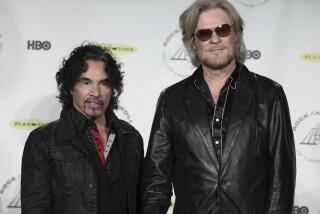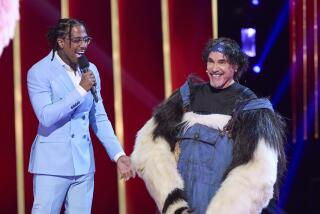Reunited Oates & Hall to Serve Up Hits
- Share via
Don’t expect a lot of frills or filler when Daryl Hall and John Oates take the stage tonight at the Pacific Amphitheatre. Having reunited this year following a three-year break, the purveyors of blue-eyed soul are concentrating on the hits.
“The show is nearly three hours long, so we’re really bombarding our audiences with all the old favorites as well as material from the new (‘Ooh Yeah!’) album,” singer Hall said during a recent interview in Los Angeles.
“There’s not even time for an opening act,” guitarist Oates added, “which must mean we’re really hogging the limelight.” But then, with a string of hits as long as this duo’s, including “Out of Touch,” “Kiss on My List,” “I Can’t Go for That (No Can Do),” “She’s Gone,” and “Maneater,” these guys can afford to hog the limelight with impunity.
Which of course brings up the question of why, when they were at the height of success, did Hall and Oates decide to call it quits?
The usual answer--that personal and artistic differences eventually became unbearable--just doesn’t seem to hold true with these two.
In fact, sitting in their plush Los Angeles hotel suite, they both look happy and relaxed and talked respectfully about each other, rather like an old married couple who know each other well enough to argue but not well enough to seriously contemplate divorce.
“The truth is, we never said, ‘That’s it; it’s over,’ ” said Hall, the pair’s more outgoing half. “I guess people felt that we had broken up, but it was very open-ended as far as we were concerned. It was more of a rest. If we’d felt the magic was gone when we got back together, yeah, we might have broken up permanently. But I don’t think either of us believed that’d happen.”
“We’ve been together for almost 20 years now, and we needed a break,” Oates said. “I think we also felt it’d be hard to top everything we’d done, especially after the Apollo show,” referring to their 1985 performance in New York with David Ruffin and Eddie Kendrick and other ‘50s and ‘60s soul performers.
Hall, his eyes shining at the memory of that night like any fan’s, added: “It was just a case of: ‘What the hell are we going to do next?’ ”
In the interim, Hall decided to pursue another long-cherished dream in the recording of his second solo album. (His first, with ex-King Crimson guitarist Robert Fripp, entitled “Sacred Songs,” was released in 1980.) Moving to London, Hall hooked up with Dave Stewart of the Eurythmics as producer and in 1986 released “Three Hearts in the Happy Ending Machine.”
Although a critical and personal success for Hall, the album failed to live up to a commercial happy ending. But it did serve a purpose: “It made me realize the difference between a Daryl Hall record and a Hall & Oates record,” Hall said. “It’s hard to put it into words, but it comes down to the sound of our separate voices and the way they blend together.”
During his portion of the three-year sabbatical, Oates produced an album for the Canadian band Parachute Club and moved to Australia to work on songs with Icehouse singer Iva Davies, which resulted in the single “Electric Blue,” a track that also featured Oates’ distinctive harmonies. He also used the time off to take to the sky.
“I learned to fly (an airplane) solo, which is something I’d been aiming towards for quite a while,” he said. “I like to do stuff like that, to get totally away from the music business.”
By contrast, his partner considers himself “much more one-sided. I like to read and hang around my house in the country, but I mainly like to just make music and listen to what’s happening and soak it all up. So by the time we decided to get back together and try writing something again, all those influences gradually surfaced.”
“Our biggest problem is when we try to be white,” Hall said. “For a long time we felt like freaks ‘cause we wanted to be part of the white rock ‘n’ roll scene but because all our records were (best) received on black radio, we had a tough time breaking in. That’s why it’s ridiculous when people accuse us of commercializing black music. We started on black radio, and we’ve still never really been accepted by the white community. It’s still a mixed reaction.
“Yeah, I don’t think you could say success has spoiled us,” Hall said. “We’ve never led the sort of insulated lives that extreme success brings. It’s always been up and down for us, so we kept our soul.”
More to Read
The biggest entertainment stories
Get our big stories about Hollywood, film, television, music, arts, culture and more right in your inbox as soon as they publish.
You may occasionally receive promotional content from the Los Angeles Times.










